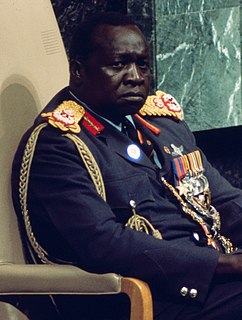A Quote by Forest Whitaker
I certainly don' think I could've played the character [Idi Amin] the same way without being in Uganda. I loved working in Uganda.
Related Quotes
I'm really excited that people are receiving my performance like this. It makes me feel good, because I've been working really hard. And this character [Idi Amin], I worked particularly hard on. But I don't want to get too caught up in it, because first of all, it could lead to a great disappointment. You never know what's going to happen.
I was pretty much consumed by this character. Even when I was off, I was continually searching to find something else new about [Idi] Amin, and to embed myself deeper into the culture to the point that, in the end, I was so entrenched that I could tell what tribe someone was from just by looking at them.
I submerged myself in all the information that I could find about Idi Amin. I mean, before I left Los Angeles, I was studying Kiswahili. I was working on the dialect. I was studying every documentary and tape of him that I could find - not just visual, but also audiocassettes, even in other languages when he was speaking in other dialects.



























